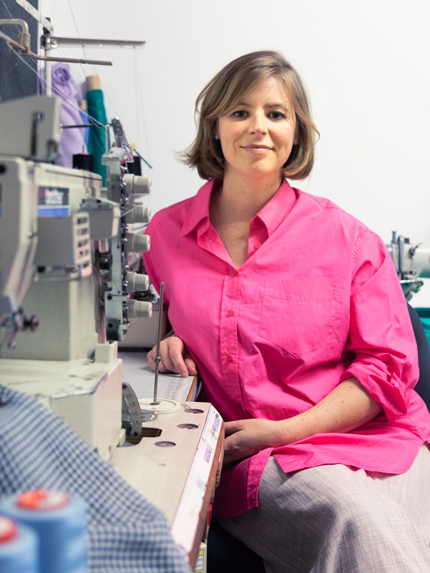Providing the chance

It’s not hard to fall in love with the silk garments and soft, woollen knits on the clothing racks inside the stores of New Zealand fashion label, RUBY.
It’s even easier to fall in love with the story woven into the business.
RUBY General Manager Emily Miller-Sharma has made it her mission to extend her work well beyond producing pretty patterns.
She’s committed to changing historical patterns within the fashion world by creating new opportunities for the future industry through the RUBY Academy Apprenticeship Workshops.
“The apprenticeships address a skill shortage in the New Zealand manufacturing scene,” Emily says. “As many machinists and cutters reach retirement age, there just isn’t that new generation being trained in the way others were.”
It also addresses the predictions of widespread unemployment due to Covid-19, plus the volumes of fabric wasted in the production process – from unusual shapes left behind when cutting out the arm or neck of a t-shirt, to the flecks and flaws commonly found in fabric rolls.
“These make great materials for apprentices to learn and practise with; it can be expensive for someone who is learning,” Emily says.
Apprentices will develop skills in the Auckland workshop and have guidance from the label’s patternmaker, sample machinist and creative director. Garments will be sold online, with RUBY and the apprentice each taking a half share of the sale price.
Emily says the feeling of empowerment that comes through the opportunity to learn is universal, and she’s excited to work alongside budding machinists, cutters and patternmakers from all walks of life and stages in career.
“Education is so important. Learning something new makes you feel like you belong; like you’re part of a community and that you have worth,” she says. “The RUBY Academy is big on the idea of life-long learning. We think it’s important to stay curious.”
Continual learning is something that Emily embraces in other avenues of her life and business, from welcoming her first child earlier this year, to launching the RUBY Academy in 2018 to provide in-house training to employees, giving them the chance to diversify their knowledge across different departments.
During the nationwide lockdown, she released a series of clothing patterns and DIY jewellery kits for customers to try their hand at making. She’s even introduced beehives at her central Auckland workshop and is training staff to keep bees.
“It’s important that we have bees in the city and as we have the ability to support that, we need to make sure it happens,” Emily says. “It’s about understanding what we are good at and what the natural extension of that is in the wider community. It’s about asking ‘what is it that I can control and how is my time best spent?’”
Emily says addressing sustainability in business doesn’t seem so overwhelming that way. “We can only do so much, but we can do small things that genuinely add to the greater movement,” she says.
“Companies feel less fearful talking about what they’re doing in the realm of sustainability because they don’t have to have done everything perfectly; the job is never done.”
Reported by Monica Tischler for our AA Directions Spring 2020 issue
